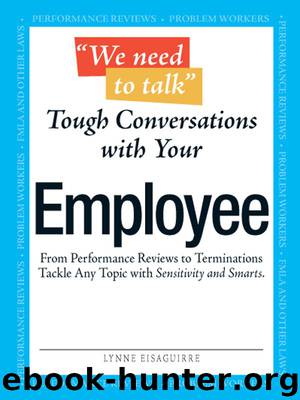We Need To Talk Tough Conversations With Your Employee by Lynne Eisaguirre

Author:Lynne Eisaguirre
Language: eng
Format: epub
Tags: ebook, book
Publisher: Adams Media, an F+W Media Company
Published: 2009-07-15T00:00:00+00:00
In one study, 69 percent of private-sector companies were found to conduct drug tests, yet only 5 percent of workers came up positive. Even when employers reasonably suspected drug abuse, less than 15 percent of employees tested positive.
This has led many advocates to claim that drug testing is an invasion of privacy and overly broad. They make this argument based on the theory that drug testing invades our bodies, a very personal zone for most of us. Unfortunately, a urinalysis not only reveals illegal drug use, but also any other medication taken for depression, HIV, epilepsy, high blood pressure, and other private and sensitive medical conditions. It is basically surveillance of someone’s private life.
Because of these concerns, the U.S. Supreme Court has found that employers must have a compelling reason to test for drugs. Compelling reasons have included safety issues, such as upholding the right to test employees for drugs immediately after work-related accidents. The Supreme Court has limited the availability of drug testing for employees currently working because it is overly broad and results in a lot of false positives—up to 1 to 2 percent. That may sound like a small amount, but given that 10 million employees are tested each year, hundreds of thousands are being falsely accused of drug use based on faulty tests. Some experts believe the rate of false positives is as high as 62 percent.
Despite these problems, the Supreme Court has upheld drug testing for jobs where there are health and safety concerns such as employees with national security clearances, airline personnel, corrections officers, transportation employees, chemical weapons plant employees, Army civilian employees, police officers, nuclear power plant workers, and water treatment plant workers.
What about testing for drugs when you believe that you have a reasonable suspicion that employees are using on the job? A 1997 California appellate case provides a cautionary tale. A senior manager saw an executive secretary sitting with her elbows on her knees, looking down at the ground. She didn’t move or answer when he asked her what was wrong. He called HR and told them he thought she was having “female problems.”
In addition to federal cases, there’s been a lot of state-level litigation about drug testing. Every state has some privacy protections, and fifteen states have statutes specifically regulating drug tests. In most states, pre-employment testing has been upheld, but not random tests for employees in nonsensitive positions.
Download
This site does not store any files on its server. We only index and link to content provided by other sites. Please contact the content providers to delete copyright contents if any and email us, we'll remove relevant links or contents immediately.
The Motivation Myth by Jeff Haden(5196)
Audition by Ryu Murakami(4917)
Adulting by Kelly Williams Brown(4558)
The Confidence Code by Katty Kay(4242)
A Mind For Numbers: How to Excel at Math and Science (Even If You Flunked Algebra) by Barbara Oakley(3290)
Waiting in the Wings by Melissa Brayden(3207)
Self-Esteem by Matthew McKay & Patrick Fanning(3132)
Fooled by Randomness: The Hidden Role of Chance in Life and in the Markets by Nassim Nicholas Taleb(3100)
The ONE Thing by Gary Keller(3056)
Nice Girls Don't Get the Corner Office by Lois P. Frankel(3034)
The Dictionary of Body Language by Joe Navarro(2984)
How to be More Interesting by Edward De Bono(2786)
Designing Your Life by Bill Burnett(2727)
Getting Things Done by David Allen(2686)
The Plant Paradox by Dr. Steven R. Gundry M.D(2599)
Police Exams Prep 2018-2019 by Kaplan Test Prep(2535)
What Color Is Your Parachute? 2015 by Richard N. Bolles(2297)
Dangerous Personalities by Joe Navarro(2274)
When to Jump by Mike Lewis(2239)
